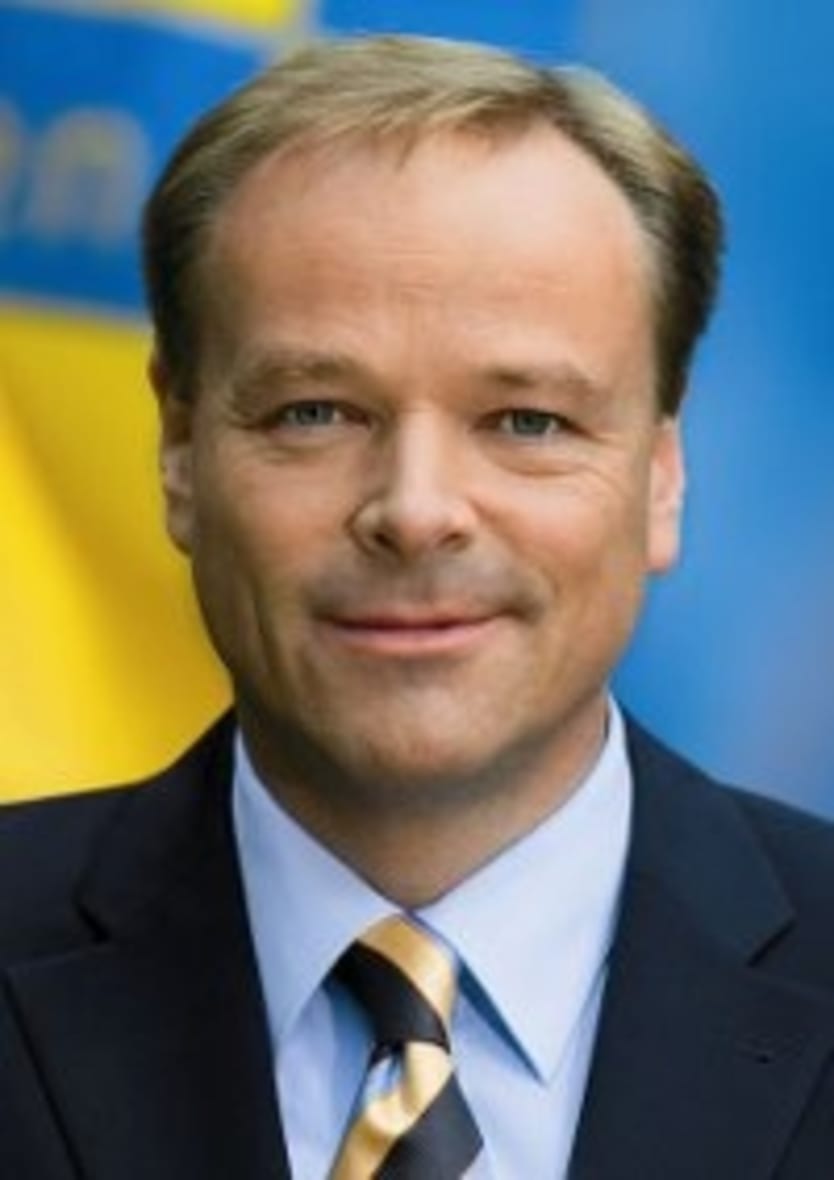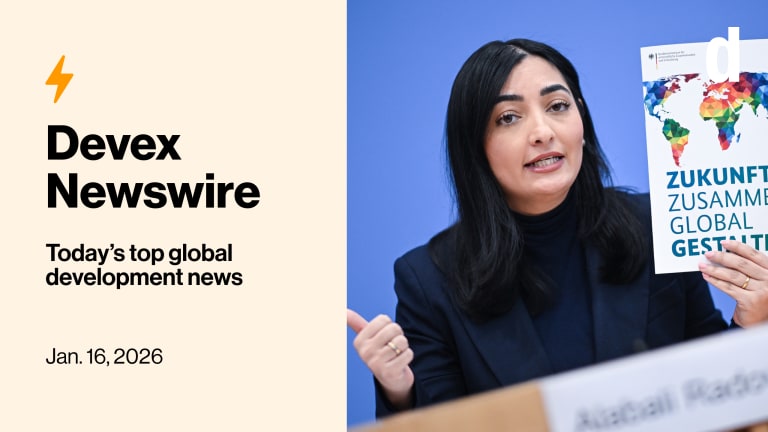
After much political drama, the newly formed aid agency Gesellschaft für Internationale Zusammenarbeit, or GIZ, kicked off on Jan. 1, marking Germany’s most sweeping reform of development cooperation in years.GIZ, created by merging three aid organizations – German Technical Cooperation, or GTZ, German Development Service, or DED, and Inwent – is expected to be more efficient but, in the eyes of some critics, not necessarily more effective.
The startup of the entirely government-controlled GIZ is expected to alter the way the world’s third-largest bilateral donor spends some USD12 billion per year. Although it appears that no immediate changes to staffing and contracting are planned as part of the merger, longer-term plans are hard to gauge.
Federal Minister of Economic Cooperation and Development Dirk Niebel called the final accord, signed Dec. 16 in Berlin by leaders of the three leading German aid organizations, “historic” and noted that the country’s ruling coalition had, despite significant challenges and an “ambitious” time frame, achieved a feat that eluded three previous governments.
>> German Cabinet Approves Aid Agencies’ Merger
The merger is set to put the federal government back in charge of development cooperation and increase its effectiveness by “reducing parallel structures,” according to Niebel. These are striking comments from a man who, as secretary-general of the liberal Free Democratic Party in 2009, campaigned for tearing down the German Federal Ministry for Economic Cooperation and Development, or BMZ, and transferring its functions to the foreign affairs office. But shortly after becoming a junior coalition partner in the government of Chancellor Angela Merkel and receiving the development portfolio, Niebel and FDP dramatically reversed their position. The intention for the merger was declared, and the three aid agencies were made to draft an action plan – or else the proposal would have come from the minister, sources within the agencies said.
Effect on staffing and procurement
Almost as soon as reform plans were announced, BMZ declared that, during the transition period, no significant changes in the everyday business of the three organizations were to be expected. The city of Bonn, which is the location of the development ministry, was chosen as the home of the merged aid organization’s headquarters, with the second seat in Eschborn, GTZ’s headquarters.
BMZ also said no staff layoffs were expected with the formation of GIZ. This is in contrast with the recent economic analysis – set as a precondition by the German Cabinet in its July 2010 approval of the reform’s implementation – conducted by consulting firm Ramboll for the German government. It showed that the merger, with a short-term reduction of 175 redundant jobs, has the potential to save euro15.76 million (USD21.07 million) annually, which provided further justification for the creation of the mega-aid agency. Ramboll’s analysis, however, is not open to the public per the decision of the German government, explained Ute Koczy, spokeswoman for development politics and member of parliament from the Greens, the German opposition political party.
Friedrich Kitschelt, BMZ’s director-general for Africa and global and sectoral affairs, said in November that the ministry understood and took seriously the concerns of employees about possible staffing changes and layoffs. He added that BMZ would guarantee that everyone was treated fairly in light of possible staff shifts.
This remains to be seen as GTZ, the biggest of the three organizations, employed more than 13,000 people around the world. DED had 3,000 employees in its roster, and Inwent had more than 800. In stark contrast to the massive employee base of its implementing agencies, BMZ only has 600 employees and plans to absorb some 200 workers who will be affected by the elimination of parallel organizational branches, the ministry’s press office announced in November. Sixty-five external advisers to BMZ, most of them previously employed by GTZ, are to become full-fledged ministry employees.
Questions and concerns
While BMZ is set to regain its political clout and expand its staff, it remains unclear how the newly formed GIZ will change the everyday tasks of development actors. Swift reforms had left German and foreign stakeholders with numerous questions and concerns. As a result, very few agreed to comment on the merger and, if they did, preferred to do it anonymously.
Among these concerns is the vagueness of the new aid agency’s structure. The German government has yet to release details on this, fueling suspicions that many kinks have yet to be ironed out at this late stage. The majority of stakeholders wanted the structure of the new organization presented to the public. Kitschelt said that as soon as the new organization was established, its management would develop the business model within the given political framework. He added that instruments and methods that proved to be efficient in the past should be kept.
As the newly formed aid agency is 100 percent government-controlled, the challenge will be to preserve the diversity of development partners, which include non-governmental organizations, one source from GIZ said. It remains to be seen how much leeway GIZ will have in its dealings with other donors. GTZ, the former quasi-governmental organization, had previous agreements with the European Commission, United Nations and World Bank.
Why the need for reform?
According to supporters and critics alike, the structural reform of German development assistance has been long overdue. The Organization for Economic Cooperation and Development’s peer review in 2005 stated that the old inefficient German development system had reached a breaking point and urged that significant structural changes be made within its implementing agencies.
Eckhard Deutscher who, until recently, led OECD’s Development Assistance Committee, told Devex in a recent interview that the organization welcomed the merger but urged the German government to do more.
>> OECD Calls for More Coherent German Development Strategy
Deutscher said DAC called on the German government to formulate a new strategy for multilateral development cooperation and strengthen the gender equality component of its development policy. DAC also encouraged the new GIZ management to work closely with KfW in order to set in motion the convergence of technical and financial cooperation in the country, Deutscher said.
Germany had been unique in a sense that development politics was driven by autonomous but often overlapping actors of technical and financial cooperation. Since the attempt by previous Federal Minister for Economic Cooperation and Development Heidemarie Wieczorek-Zeul of the German Social Democratic Party to merge GTZ and the German development bank KfW failed, the current ruling coalition decided to proceed with the merger through smaller steps, Koczy told Devex.
Prior to the creation of GIZ, the most significant reform in German development cooperation happened in 2002, when development organizations Carl Duisberg Gesellschaft and the German Foundation for International Development, or DSE, were merged to form Inwent. Also, the German government’s efforts boost its development aid efficiency included a significant reduction of the number of its partner countries, eliminating fresh funding for China, as well as for some priority sectors.
The formation of GIZ under the principle of “one face to the customer,” as announced by BMZ State Secretary Hans-Jürgen Beerfeltz, was supposedly more difficult: Former rival organizations were to be fused; each had different goals and different instruments for attaining those goals and were staffed by more than 17,000 employees in 130 countries.
In past years, BMZ was heavily criticized for its supposed lack of political leadership. Earlier last year, Tom Päetz, who directed the BMZ working group on technical cooperation reform and is now one of the executive directors of GIZ, said the merger would finally put a stop to long-standing jokes about the tail, meaning implementing agencies, wagging the dog, pertaining to BMZ.
>> German Aid Agencies’ Merger Now Formal
High-speed reform
After the fast setup and design of the merger and its approval by the German Cabinet in July 2010, task forces from GTZ, DED and Inwent, led by the BMZ working group on reform, laid the groundwork for the union of the three agencies that all had distinctly different tasks, legal bases and funding sources.
GTZ had been providing technical assistance and focusing on capacity building, DED sending what one source described as “more idealistic” development workers out into the field, and Inwent had been focusing on providing trainings and seminars to local professionals. Now that the new German development organization is operational, everyone is waiting to find out how it will restructure, overcome challenges and harmonize the different focus areas and instruments of the three organizations, a source said.
Even though GTZ, DED and Inwent employees confirmed that they actively participated in discussions and consultations related to the merger, faulty communication between the three organizations has been observed during the reform process. This could be traced to the individual organizations’ need to protect their interests.
The source added that, while sometimes cooperative, GTZ, DED and Inwent were often in competition with one another. Each had a different philosophy and distinct way of doing business.
Each may need some time to stop viewing itself as an autonomous entity and pursuing its own agenda.
All told, the merger happened in record speed as the German government - and especially FDP - clamored to win political points amid sagging public approval ratings. And yet, even before the merger agreement was signed, the government came under fire for alleged sexism when Niebel announced that all seven inaugural members of GIZ’s executive board were male.
>> Germany Names New Aid Agency’s Executive Board Members
Measurement of success
The reform has been met with some criticism. It can be viewed as “window-dressing” since it reduces parallel structures and makes development cooperation more efficient but not necessarily more effective, a former high-level GTZ employee told Devex. In two years’ time, it will be impossible to measure if the development assistance provided by GIZ is better than those by GTZ, DED and Inwent as individual entities, said the source. He added that, to his knowledge, no audit was set and no qualitative and quantitative indicators were identified to measure the success.
In order to improve its development aid delivery, the German government should have undertaken research in and discussions with partner countries rather than in Germany, our source argued. The ambassador of Mozambique to Germany, Carlos dos Santos, said he welcomes the merger but it remains unclear how these changes will affect development processes in his country. As Mozambique cooperates with some 19 other donors “in a harmonized fashion,” dos Santos said he wishes his country had the chance to discuss the reform with Germany earlier to ensure this “does not turn into another layer of bureaucracy.”
Meanwhile, speaking on Nov. 24, 2010, at the Weiterdenken! (Think Ahead) conference, Kitschelt said development policy and projects will be agreed upon by the German government and its partner countries. He added that there will be no major changes and partner governments will be asked to participate in the development process. All current projects will continue, he said. How efficiently and effectively they will be carried out will be the true test of the reform’s success.
Will Germany’s new aid agency make the country’s aid efforts more effective? Let us know what you think by posting a comment below.








